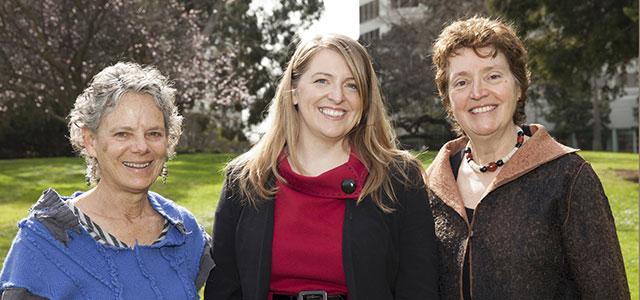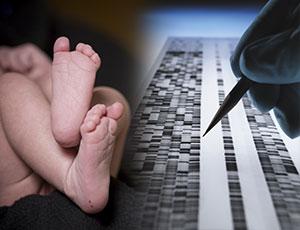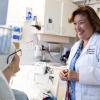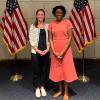
From left: Carol Somkin, Julie Harris-Wai and Barbara Koenig
Doing the Genomics Revolution Right
Since the 1960s, hospitals around the United States have been pricking the heels of newborns to gather a few spots of blood. Today, the test screens nearly 4 million babies annually for phenylketonuria, congenital hypothyroidism and other disorders that can be helped by early interventions.
In a few years, it might be possible for laboratories to use those spots to sequence and analyze a newborn’s entire genome. With this new technology, parents could gain vastly more information about their child’s health.
But is this necessarily a good thing? Is it useful, for example, for parents to know their day-old infant has a genetic variation that may mean an increased risk of developing cancer or Alzheimer’s disease decades later as an adult?
“Do you reveal those results to parents, even if risks for certain gene variants are unclear? How does it change the way they think about their child or about their decisionmaking around having other children?”
A Home for Asking the Right Questions
The person asking those questions is Barbara Koenig, co-director of the new Center for Transdisciplinary Ethical, Legal and Social Implications (ELSI) Research in Translational Genomics (known as CT2G), housed at UC San Francisco School of Nursing’s Institute for Health & Aging. Koenig is a nurse and a professor of medical anthropology and bioethics based at the institute.
CT2G, a joint project of UC San Francisco, UC Hastings College of the Law and Kaiser Permanente’s Division of Research, brings together scientists and scholars from a range of disciplines to explore the ethical, legal and social implications of genomics in large-scale epidemiological studies and individual patient health care. The disciplines include genomic research, bioethics, law, behavioral and social sciences, clinical research, public policy and theology.
To be sure, Koenig, an internationally renowned expert on bioethics and genomics, believes the technology offers unprecedented opportunities for scientists to research diseases and develop precision medicine – treatments targeted to individuals based on their genetic makeup.
At the same time, Koenig said individuals and society will only truly benefit from this technology if practices and policies are in place that allow public governance and oversight, protect patient privacy, prevent racial and gender disparity in diagnosis and treatment, guarantee transparency about the promises and risks of research and offer people valuable information to make informed health care decisions.
In the more than 10 years since an international research program finished sequencing an entire reference human genome, the National Human Genome Research Institute (NHGRI) has placed a priority on establishing centers like CT2G around the country. NHGRI provided CT2G with a three-year, $778,000 grant.
Collaborating Inside and Outside of UCSF
 CT2G is co-directed by Carol Somkin, a research scientist with the Kaiser Permanente Division of Research. UCSF and Kaiser Permanente have a long history of working together in human genomics research. Since 2008, UCSF has collaborated with Kaiser’s Research Program on Genes, Environment, and Health, a biobank of more than 200,000 genetic samples from Kaiser Permanente Northern California members, which are being used in epidemiological studies of genetic and environmental influences on health and disease.
CT2G is co-directed by Carol Somkin, a research scientist with the Kaiser Permanente Division of Research. UCSF and Kaiser Permanente have a long history of working together in human genomics research. Since 2008, UCSF has collaborated with Kaiser’s Research Program on Genes, Environment, and Health, a biobank of more than 200,000 genetic samples from Kaiser Permanente Northern California members, which are being used in epidemiological studies of genetic and environmental influences on health and disease.
CT2G takes the UCSF and Kaiser collaboration to a new level, explained Julie Harris-Wai, associate director of the center, who is also an assistant professor with the Institute for Health & Aging and a staff scientist at Kaiser Permanente’s Division of Research.
“It will provide a place where experts can generate better, more informed science in general,” she said.
For example, Harris-Wai and Koenig are looking to answer some of those difficult questions surrounding newborn screening. With the California Department of Public Health, they are developing a program to bring together lay people from diverse backgrounds to discuss their concerns about the various implications of genomics in newborn screening.
Creating Education and Research Opportunities
CT2G also has several other major initiatives. One is creating education and research opportunities for scientists, scholars and clinicians working in a variety of fields, including nursing, pharmacy, genetic counseling and clinical medicine.
CT2G also is wrapping up a seven-week online interdisciplinary course, “Ethical and Social Challenges of Genomic and Precision Medicine.” Offered free through the online platform Coursera, the class was taught by Koenig, Harris-Wai and Wylie Burke, a professor and former chair of the Department of Bioethics and Humanities at the University of Washington and the 2013-14 UCSF Presidential Chair.
“One of the main things that the center will be doing is posing questions before the technology comes on board and we’re having to put the genie back in the bottle,” said Jaime King, a professor at UC Hastings and a member of CT2G’s executive committee.
She and Marsha Michie, an anthropologist who joined the Institute for Health and Aging this past summer, are focusing on issues in prenatal genetic testing where the genie may be starting to escape. A noninvasive prenatal test, or NIPT, became available in 2011: using a maternal blood sample, it allows expectant parents to learn as early as 10 weeks into pregnancy if the fetus is at risk for Down syndrome and other genetic disorders.
While its predictions about Down syndrome come with a high level of certainty, NIPT can’t provide final confirmation on the other disorders. This confirmation must still come through invasive tests, such as amniocentesis in the second trimester.
Still, NIPT is poised to become a routine part of prenatal screening, King said. And, as with newborn heel-stick screening, NIPT may also one day be used to sequence a fetus’s entire genome. Moreover, King notes, start-ups are eyeing the technology in the hopes of offering the testing directly to consumers.
Some parents might find it useful to know all sorts of information about their child’s future health risks, especially if the data allows them to prepare emotionally and seek out early treatment for potentially serious disorders. Others, however, might find the information overwhelming, especially if health care providers don’t deliver it in a clear, meaningful way. King said parents might use data gleaned from the test to make important decisions about their child’s future, including whether to terminate a pregnancy.
Considering Ethical Implications Before Genie Is Out of Bottle
As Koenig has said, the brave new world of genomics research offers enormous promise for the future of health care. CT2G brings together stakeholders involved in deploying this rapidly developing technology to clinical settings, so they can recommend how it can be used in ways that truly help society and individual patients.
“Thinking about the ethical implications of powerful new genomic technologies in a structured way is a moral imperative,” she says.



